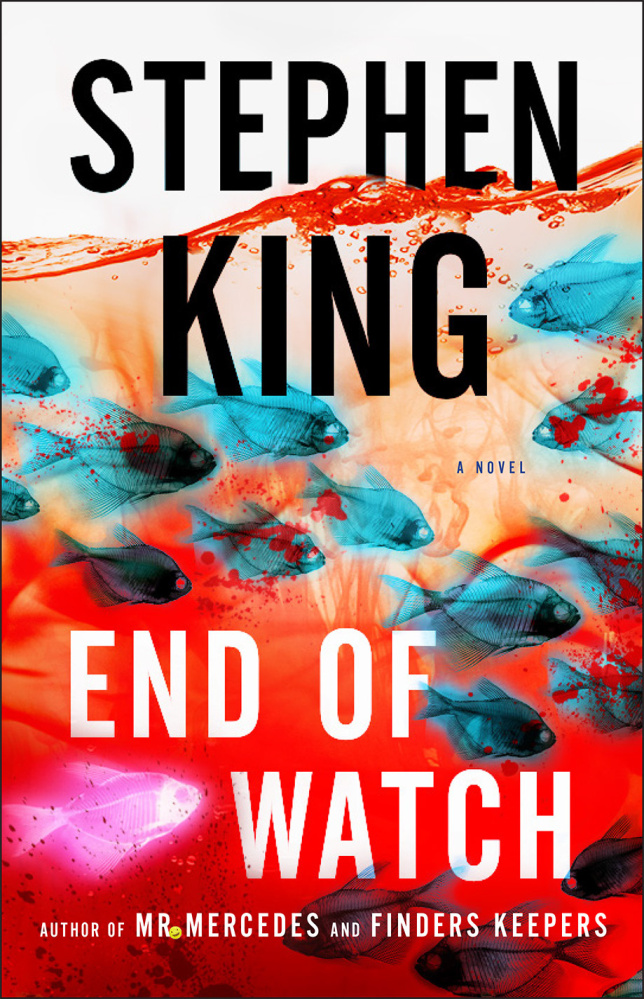Begun in 2014 with “Mr. Mercedes,” Stephen King’s Bill Hodges Trilogy has proved to be a welcome change of pace for the best-selling Maine author. This is the first time King has produced three related thrillers in rapid succession, and the exercise has proved to suit the author’s storytelling temperament well.
The trilogy’s final installment, “End of Watch” opens with a flashback to the foggy April morning in 2009 when a sociopath named Brady Hartsfield drove a stolen Mercedes-Benz into a crowd of job-seekers, killing eight and injuring 15. Almost seven years later, one of the grievously injured survivors, Martine Stover, is the victim of a suspected murder-suicide. The case comes to the attention of retired cop K. William “Bill” Hodges, one of the original investigators of the massacre. He and Holly Gibney, his partner in the Finders Keepers private investigation firm, come to believe that the tragedy has a close connection to the Mercedes killings.
Following his hit-and-run bloodbath, Hartsfield tried to facilitate an even more deadly plot, planning to blow himself up at a sold-out teen concert. Only the fast, skull-crunching action of Holly at the end of “Mr. Mercedes” prevented a second tragedy. In “End of Watch,” Holly calls Hartsfield “an architect of suicide,” an expert at goading the vulnerable into taking their own lives. She’s more right than she knows.
Hartsfield has resided at the Lakes Region Traumatic Brain Injury Clinic for seven years, and he usually appears unresponsive, trapped in a vegetative state. But Hodges and others suspect there’s something malevolent going on behind his blank stare, especially when the window blinds ripple and picture frames fall over without anyone touching them. What they don’t know is that a high-ranking neurologist has been secretly treating Hartsfield with an experimental drug that seems to boost the killer’s brain function and latent telekinetic abilities.
Thanks to a defective hand-held gaming device, erstwhile computer genius Brady finds a way to let his mind leave the confines of his ruined body and convince his enemies and innocent bystanders to harm themselves. Once again, he sees the opportunity to wreak havoc while exacting revenge on Hodges and the people closest to him.
“Mr. Mercedes” and “Finders Keepers” are each reasonably realistic crime thrillers. Much of their enjoyment comes through watching Hodges, Holly and their tech-savvy teen friend Jerome Robinson solve crimes through the power of logic and the force of their individual personalities. The ways in which King has developed Hodges’ friendship with Holly are especially well constructed, their scenes marked by a charming poignancy, as she learns to tame the anxieties that have dogged her since her traumatic childhood and Hodges marshals the patience and kindness to support her in her new, less circumscribed life.
Each volume in the trilogy has its distinct merits. “Mr. Mercedes” won last year’s Edgar Award for Best Novel on its strength as a propulsive cat-and-mouse thriller. “Finders Keepers” is a smart and accomplished meditation on the powerful bond between writers and their audiences. “End of Watch” adds to the mix a strong dose of the paranormal only hinted at in the first two books.
In addition to the clandestine regimen of experimental drugs, King justifies Hartsfield’s mind-control ability by referencing a notorious real-life incident, in which an episode of the animated “Pokemon” TV series induced seizures in some unsuspecting young viewers. As a rationale for a high-tech suicide-inducing weapon, the correlation borders on the far-fetched, even as it makes a satirical point about the addictive nature of cartoons and social media.
For some readers, this strong note of unreality may be tonally jarring, as if the members of “CSI: Cyber” had to track down a suspect who can time-travel. But both the mundane and the magical have always been part of the King multiverse. Maybe there is no good reason to keep them apart here, despite the potential grumblings of hard-boiled crime fiction purists.
In any case, once the plot of “End of Watch” gets up and running, most readers will be flexible enough in their suspension of disbelief to enjoy the creepy twists, clever callbacks and poignant revelations. The wintery, blood-soaked climax of the novel provides a fitting resolution not only to the action at hand but to the trilogy as a whole.
King will always be best known for his tales of supernatural horror, but it’s great fun to watch him experiment with form, genre and subject matter. He has more than his fair share of laurels, but he never seems to rest on them.
Here’s hoping King can maintain the creative momentum of the Bill Hodges Trilogy as he heads into the next uncharted literary territory.
Berkeley writer Michael Berry is a Portsmouth, New Hampshire, native who has contributed to Salon, the San Francisco Chronicle, New Hampshire Magazine, the Los Angeles Review of Books and many other publications. He can be contacted at:
mikeberry@mindspring.com
Twitter: mlberry
Send questions/comments to the editors.



